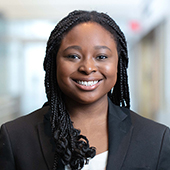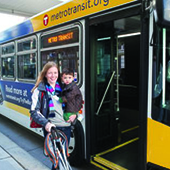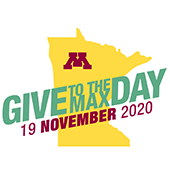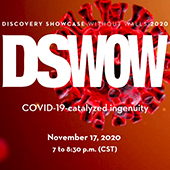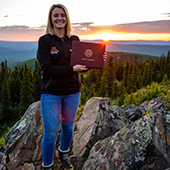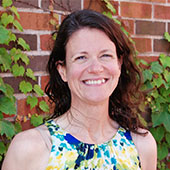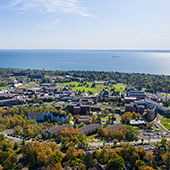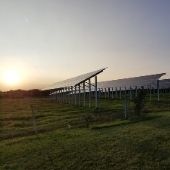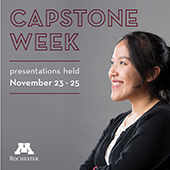Holiday schedule: Brief will not publish on Nov. 25 and Dec. 2.
- Features: Finding the code to success; New approach could help cities address gender equity in transportation plans.
- Awards and Recognition: Michael Osterholm has been named to the Biden-Harris COVID-19 Advisory Board; and more.
Finding the code to success
As a teenager, Governess Simpson wanted to be a singer. “Sixteen-year-old me was thinking pop music,” she says. But her advanced placement chemistry instructor at Stillwater Area High School thought she had what it took to be a chemical engineer. The University of Minnesota’s reputation in the field led her to the College of Science and Engineering, where she is working toward a career in software engineering.
New approach could help cities address gender equity in transportation plans
Women often have different transportation needs, and face different transportation challenges, than men. However, these disparities are largely unaddressed in transportation plans and policies, and specifically in comprehensive city plans. For her master’s thesis, Humphrey School of Public Affairs graduate Ania McDonnell studied gender disparities in transportation and crafted recommendations for cities—some that could be used now.
Awards and Recognition
Michael Osterholm has been named to the Biden-Harris COVID-19 Advisory Board; Cheryl Robertson has been named the recipient of the Faye Abdellah Leadership Award by the Friends of the National Institute of Nursing Research; CIDRAP has received a grant from the Carlson Family Foundation to support its COVID-19 news coverage and related activities; U in the News features highlights of U faculty and staff cited in the media. Awards and Recognition
Join the U of M Social and Racial Justice Scholar Directory
A new Social and Racial Justice Scholar Directory is being created to highlight and amplify the work of faculty who engage in scholarship related to social justice, racial justice, diversity, equity, and inclusion. This directory project, led by the Institute for Diversity, Equity, and Advocacy; the Office for Public Engagement; and Faculty and Academic Affairs (Office of the Executive Vice President and Provost), will foster systemwide connections around related issues. Faculty interested in being in the directory are invited to complete this form.
Nominations for U of M Equity and Diversity Awards now open
Nominations are now open for the Josie R. Johnson Human Rights and Social Justice Award and the Outstanding Unit Award for Equity and Diversity. The Josie R. Johnson Award honors U of M faculty, staff, and students who exemplify Johnson’s commitment to creating respectful and inclusive living, learning, and working environments. The Outstanding Unit Award honors exemplary campuses, colleges, departments, or units that demonstrate leadership in equity and diversity work. Nominations for both awards are due by Feb. 1, 4:30 p.m.
Osterholm Update: Episode 30: A New Dialogue
In episode 30 of the Osterholm Update podcast, Michael Osterholm and host Chris Dall discuss record-breaking case numbers in the U.S., public trust in science amid the COVID-19 pandemic, expectations for vaccines, more details related to bubbling, and the risks associated with gatherings.
Could microbes play a role in COVID-19 outcomes for pregnant mothers, infants?
Cheryl Gale, Department of Pediatrics, received a CO:VID grant to study if and what associations exist between gut microbiomes and COVID-19 health outcomes for pregnant mothers and infants infected with SARS-CoV-2.
U of M and Big River Farms partner on cover crops to increase profitability for underrepresented farmers
The story of how Big River Farms and the University of Minnesota are working together to improve soil health, pollinator habitat, and landscape cover has a number of intriguing plots—all of them centered on cover crops and intended to make the science of environmentally friendly farming accessible and beneficial to emerging farmers. These emerging farmers represent a growing population of food producers in Minnesota and the upper Midwest.
Supporting health care at a distance
The Great Plains Telehealth Resource and Assistance Center (gpTRAC), housed in the Institute for Health Informatics, is committed to expanding telehealth programs for rural and underserved communities and helping telehealth meet its full potential. gpTRAC’s impact extends across a six-state region and within the University.
UMN HELPS drives community care
COVID-19 has greatly affected the health of Minnesotans and exacerbated the disparities present in BIPOC and immigrant communities. To help address these disparities and more effectively reach communities in need, the University of Minnesota recently launched an interprofessional mobile health care initiative. UMN HELPS (Health Equity through Local Partnerships and Service) brings together University experts and students with community partners to deliver a range of urgently needed health care services.
Nov. 18 - 2020 Spatial Forum and Bochert Lecture featuring Carl Steinitz
Celebrate GIS Day at the 2020 Spatial Forum, a yearly event highlighting spatial research, teaching, and outreach. This event is open to the public and features the Borchert Lecture and a panel discussion. Noon-2:15 p.m.
Nov. 19 - Mark your calendar: all-digital Give to the Max Day 2020
Join colleagues and the University community in showing your U of M pride during Give to the Max Day by using #UMNGive on social media and supporting your favorite University causes. Visit givingday.umn.edu for details on one-day matches, how a gift or post could win bonus funds for U of M causes, and how you can have an impact on systemwide social justice initiatives and student emergency programs.
Research Brief: Reducing global food system emissions key to meeting climate goals
Reducing fossil fuel use is essential to stopping climate change, but that goal will remain out of reach unless global agriculture and eating habits are also transformed, according to new research from the University of Minnesota and University of Oxford.
U of M featured virtual events
Nov. 12 - Getting China Right: Challenges for the New Administration
Nov. 16 - Secrecy and Publicity: Faculty Works in Progress
Nov. 17 - Discovery Showcase WithOut Walls: COVID-19-catalyzed ingenuity
Nov. 18 - Retirement Savings During COVID-19
Nov. 19: Advancing Social Justice through International Education
Nov. 24 - Polling in the 2020 Elections
Dec. 1-2 - Diversity Data Deep Dive 6 - Navigating the Two Pandemics: COVID-19 and Systemic Racism
Daml forges a path from Alaska to Crookston and beyond
Lindsey Daml came to the U of M Crookston from North Pole, AK. It has sometimes been a rocky road for the Golden Eagle soccer player, as she has battled through injuries her entire career. Just when she thought she was healthy to return, COVID-19 hit and canceled her fall (and final) season. Despite the pitfalls, Daml is working toward a degree in natural resources and preparing herself for her next journey, whether that includes soccer or not.
Lessons reimagined
Associate Professor Jennifer Kreps Frisch has long believed that outdoor experiential learning and the creative use of technology are some of the best ways to help young people learn. Now, with teachers looking for new ways to educate students during a pandemic, Kreps Frisch’s curriculum may provide teachers with fresh (and healthy) ways to deliver lessons to young people.
Diversity and managing bias training
UMD has partnered with EVERFI to provide educational offerings related to Goal 2 of UMD’s strategic plan: create a positive and inclusive campus climate for all by advancing equity, diversity, and social justice. Recently, faculty and staff received an invitation to complete the Diversity: Inclusion in the Modern Workplace and Managing Bias training modules. Faculty and staff are asked to complete the two modules by Dec. 31.
U of M Morris highlighted in Sustainable Campus Index
U of M Morris has been highlighted for its sustainability efforts in the 2020 Sustainable Campus Index, a publication from the Association for the Advancement of Sustainability in Higher Education. The campus is listed among the top performers in the area of water and among baccalaureate institutions.
Nov. 23-25 - Capstone presentations
Fall graduates of UMR's Bachelor of Science in Health Sciences (BSHS) program will present their capstones. A capstone is a combined set of learning experiences focused on an individualized theme that aligns with each student's personal and professional goals. BSHS students have the unique opportunity to personalize their education with a capstone experience.
Twin Cities to host COVID-19 community testing site
As Minnesota experiences a significant rise in COVID-19 cases, the Twin Cities campus will host a two-day COVID-19 testing event at the Field House on Nov. 16 and 17, noon to 6 p.m. Testing at this site, held in partnership with the State of Minnesota, is free. Students, faculty, staff, and community members who are near campus are encouraged to be tested (make an appointment) for COVID-19 during this event, even if you are not symptomatic or concerned about a possible exposure. View a video to learn more about what to expect at the testing site, and visit the Safe Campus website to learn more about testing.
How can air filtration reduce the risk of COVID-19 spreading in your home?
When College of Science and Engineering professor Chris Hogan began studying aerosols in 2003, the majority of researchers in the field were focused on how the small particles impact outdoor air. But with the COVID-19 pandemic, that has begun to change. For the past six months, Hogan, who is also editor-in-chief of the Journal of Aerosol Science, has been studying the impact of recirculating air purifiers on virus aerosols and how they disperse throughout indoor spaces like offices.
Systematically expert
Two U of M librarians—Megan Kocher and Julie Kelly—served as researchers for Ceres2030, an international effort to end world hunger, which also included librarians from Cornell University. The U of M and Cornell libraries are seen as leaders in the area of systematic reviews in agriculture.
Object lessons
The students in Sally Kohlstedt’s honors course this fall, “Campus Obscura: Cabinets of Curiosity at UMN,” are virtually visiting several U of M collections and museums as they explore the reasons for why they are an intimate part of the University. And at one site, they felt the experience was close to hands-on.
